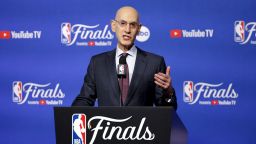Science
NCAA Faces Deadline on Proposed Rule Change for Sports Betting

The NCAA has a crucial decision to make regarding a proposed rule change that would permit college athletes and staff to place bets on professional sports. With only a week remaining before the deadline on November 21, 2023, the organization must secure paperwork from two-thirds of its Division I member schools to rescind the proposal. If the required number of schools does not respond, the rule will take effect on November 22, 2023.
Significant skepticism surrounds the potential adoption of this rule. A coach from the college sports community, who requested anonymity, expressed doubt, stating, “There’s no way that happens, right?” Currently, 241 out of 361 Division I schools must voice their opposition to halt the proposal, but a source informed CNN that “as of right now, we are not meeting that threshold.”
The proposed change marks a significant shift in NCAA policy. For years, college athletes, coaches, and staff members were prohibited from betting on any sport where the NCAA holds championships, including basketball, football, and hockey. In contrast, betting on horse racing remained permissible. As more states legalize sports betting and make it accessible to college students, the NCAA argues that the previous prohibition on professional sports betting is outdated.
Roberta Page, director of athletics at Slippery Rock University and chair of the Division II Management Council, emphasized the need for the change, stating, “This change recognizes the realities of today’s sports environment without compromising our commitment to protecting the integrity of college competition or the well-being of student-athletes.”
The proposal was initially slated to be implemented on November 1, 2023. However, its timing coincided with the unsealing of an indictment involving two separate gambling schemes tied to three New York crime families, including allegations against two NBA players and an NBA head coach. This revelation prompted immediate backlash against the NCAA’s proposal.
In a letter to NCAA president Charlie Baker, Southeastern Conference (SEC) commissioner Greg Sankey urged the organization to reconsider the change. Sankey stated, “On behalf of our universities, I write to urge action by the NCAA Division I Board of Directors to rescind this change and reaffirm the Association’s commitment to maintaining strong standards that keep college participants separated from sports wagering at every level.”
Following this outcry, the NCAA announced a delay in its decision. This postponement was not primarily due to public pressure; rather, it resulted from a lack of support among cabinet members, with less than 75 percent voting in favor of the proposal. This triggered an automatic 30-day rescission process. Notably, despite Sankey’s objections, the two SEC representatives on the cabinet voted in favor of the proposal.
In the weeks leading up to the deadline, the landscape of sports gambling has continued to evolve. Recently, two MLB pitchers were indicted for involvement in game rigging, while six college basketball players from three different institutions were permanently banned from NCAA competition for game-fixing activities.
In a further development, the New Jersey Attorney General’s office announced that 14 individuals, including student athletes, have been charged for participating in an illegal online sports betting scheme connected to the Lucchese crime family.
As the NCAA approaches its deadline, the implications of this decision extend beyond the realm of college sports, reflecting broader trends in the legalization and acceptance of sports betting across the United States. How the NCAA responds could shape the future of sports gambling in collegiate athletics, impacting not just the athletes, but the overall integrity of college sports.
-

 Top Stories3 weeks ago
Top Stories3 weeks agoMarc Buoniconti’s Legacy: 40 Years Later, Lives Transformed
-

 Health3 weeks ago
Health3 weeks agoInnovative Surgery Restores Confidence for Breast Cancer Patients
-

 Business2 weeks ago
Business2 weeks agoForeign Inflows into Japan Stocks Surge to ¥1.34 Trillion
-

 Sports1 month ago
Sports1 month agoSteve Kerr Supports Jonathan Kuminga After Ejection in Preseason Game
-

 Top Stories3 weeks ago
Top Stories3 weeks agoBOYNEXTDOOR’s Jaehyun Faces Backlash Amid BTS-TWICE Controversy
-

 Science1 month ago
Science1 month agoChicago’s Viral ‘Rat Hole’ Likely Created by Squirrel, Study Reveals
-

 Lifestyle1 month ago
Lifestyle1 month agoKelsea Ballerini Launches ‘Burn the Baggage’ Candle with Ranger Station
-

 Entertainment1 month ago
Entertainment1 month agoZoe Saldana Advocates for James Cameron’s Avatar Documentary
-

 Politics1 month ago
Politics1 month agoDallin H. Oaks Assumes Leadership of Latter-day Saints Church
-

 Science2 weeks ago
Science2 weeks agoUniversity of Hawaiʻi Joins $25.6M AI Project to Monitor Disasters
-

 Lifestyle1 month ago
Lifestyle1 month agoDua Lipa Celebrates Passing GCSE Spanish During World Tour
-

 Business1 month ago
Business1 month agoTyler Technologies Set to Reveal Q3 2025 Earnings on October 22









